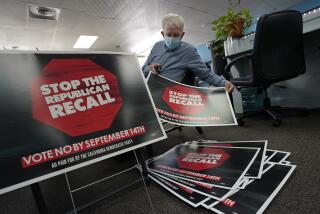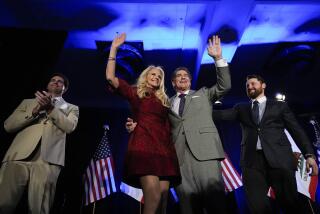Senate Panel OKs Bill for Early Primary
SACRAMENTO — Legislation to move California’s presidential primary from June to March to give the state more clout in choosing the nation’s chief executive narrowly cleared a key Senate hurdle Wednesday.
By a 6-3 vote, the minimum required, the Elections Committee approved the plan to advance the presidential primary from June 2 to March 3. The effort to hold an early presidential primary is viewed as a political experiment and, as such, the bill would apply only to the 1992 election.
The legislation still must overcome several substantial hurdles, with time running out before the Legislature’s scheduled Friday midnight adjournment.
Assemblyman James Costa (D-Fresno), sponsor of the bill, said he would amend the measure on Friday in the Appropriations Committee to provide for the early presidential primary and a second primary in June for state contests.
But the one-time provision means that the Democrat-controlled Legislature would have to pass another bill in some future year to extend the early presidential primary concept to 1996, when many expect Republican Gov. Pete Wilson to make a bid for the White House.
A Wilson press spokesman, James Lee, praised Costa’s latest proposal. “We are obviously pretty happy about it,” Lee said. “This would allow California to become a major player in presidential politics again.”
A Costa spokesman said, “The idea is to see how it works for one year. We hope it will be successful and popular with the voters so the Legislature will continue it for 1996 and after that.”
Costa argued that California’s June primary comes too late in the presidential nominating process to give the state much influence in selecting the nation’s chief executive. By that time, most other states have held their primaries and party caucuses, he noted.
As now scheduled, Iowa will kick off the 1992 presidential nominating process with caucuses Feb. 10, followed by the New Hampshire primary Feb. 18. South Dakota will hold the second primary Feb. 25, with Colorado and Maryland staging primaries March 3, the same day as California under Costa’s bill.
Under existing California law, the state’s presidential primary would be one of the nation’s last on June 2. But an early California primary would turn the national nominating process upside down, with candidates presumably being forced to concentrate on this state, with the largest bloc of convention delegates, rather than the small states that traditionally have wielded extraordinary influence.
For 1992, however, the big impact would be felt only within the Democratic Party because President Bush has a lock on the GOP nomination.
“We have been reduced to being nothing more than an automatic teller machine for presidential campaigns,” Costa said. “Candidates come here to raise money to spend in Iowa and New Hampshire and elsewhere.”
He added that an early presidential primary means California would reap a multimillion-dollar economic windfall from money spent by aspiring candidates.
“This is an attempt to move California’s presidential primary so the voters of California will have a say in who is nominated and who is elected to the highest office in the U.S.,” he said. “There is little likelihood if we do nothing that we will ever have an impact in presidential campaigns.”
The last time California’s primary significantly affected the Democratic nomination for president was 1972, when George McGovern’s victory here put him over the top. The last time that it played a pivotal role in a Republican race was in 1964, when it clinched Barry Goldwater’s nomination.
Most of the opposition to the Costa bill came from legislators who fear that two primaries would work to hamper their reelection. They argued that it could reduce voter turnout in the regular June primary, particularly among minorities, and make it tougher for some Democrats to win renomination in a tight race.
“You are going to rue the day that you split the presidential primary from the legislative primary,” warned Sen. Daniel Boatwright (D-Concord), a member of the Elections Committee. “The split dilutes the voting power of minorities.”
Another opponent, Sen. Herschel Rosenthal (D-Los Angeles), said an early presidential primary would favor “an elitist or extremist candidate, or a rich one, or a combination of all three.”
Other foes emphasized that holding two primaries could cost taxpayers as much as $40 million extra at a time when the state is facing serious financial problems.
Costa’s bill previously cleared the Assembly by a 43-22 vote in a form that called for a single consolidated March primary in every presidential election year.
But Gov. Wilson indicated he would veto the bill in that form because a state primary next March might come too soon after congressional and legislative redistricting, which could wind up being settled by the courts early next year.
More to Read
Get the L.A. Times Politics newsletter
Deeply reported insights into legislation, politics and policy from Sacramento, Washington and beyond. In your inbox three times per week.
You may occasionally receive promotional content from the Los Angeles Times.










